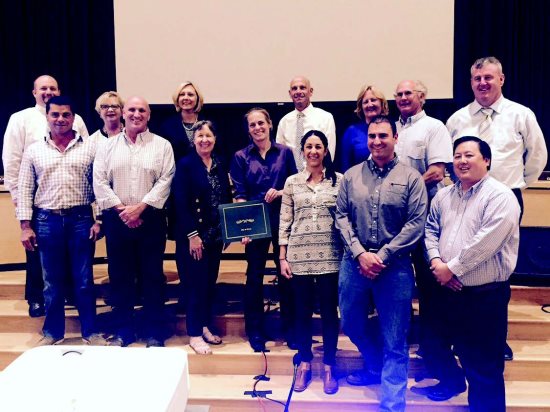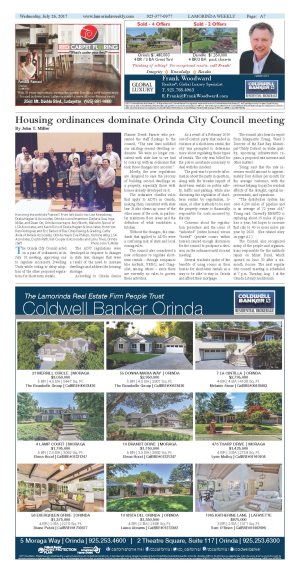| | Published July 26th, 2017
| Housing ordinances dominate Orinda City Council meeting
| | | By John T. Miller |  | | Honoring the sinkhole "heroes": From left, back row: Levi Kinnebrew, Drake Haglan & Associates, Orinda councilmembers Darlene Gee, Inga Miller, and Dean Orr, Orinda vice mayor Amy Worth, Malcolm Sproul of LSA Associates, and Kevin Ross of Drake Haglan & Associates; front row: Ben Rodriguez and Eric Barker of Bay Cities Paving & Grading, Cathy Avila of Avila & Associates, Orinda mayor Eve Phillips, Yasmine Akky, LSA Associates, Dustin Rath, Vali Cooper & Associates and Larry Theis, Orinda staff. Photo John T. Miller |
The Orinda City Council acted on a pair of ordinances at its July 18 meeting, approving one to regulate Accessory Dwelling Units while voting to delay adoption of the other proposed regulations for short-term rentals.
 The ADU regulations were developed in response to changes in state law, changes that were a result of the need to increase dwellings and address the housing shortage.
The ADU regulations were developed in response to changes in state law, changes that were a result of the need to increase dwellings and address the housing shortage.
 According to Orinda Senior Planner Derek Farmer who presented the staff findings to the council, "The new laws nullified our existing second dwelling ordinance. We were no longer consistent with state law so we had to come up with an ordinance that took those changes into account."
According to Orinda Senior Planner Derek Farmer who presented the staff findings to the council, "The new laws nullified our existing second dwelling ordinance. We were no longer consistent with state law so we had to come up with an ordinance that took those changes into account."
 Mostly, the new regulations are designed to ease the process of building second dwellings on a property, especially those with homes already developed on it.
Mostly, the new regulations are designed to ease the process of building second dwellings on a property, especially those with homes already developed on it.
 The ordinance clarifies rules that apply to ADUs in Orinda, making them consistent with state law. It also cleans up some of the other areas of the code, in particular maximum floor areas and the definition of what constitutes a kitchen.
The ordinance clarifies rules that apply to ADUs in Orinda, making them consistent with state law. It also cleans up some of the other areas of the code, in particular maximum floor areas and the definition of what constitutes a kitchen.
 Without the changes, the standards that applied to ADUs were a confusing mix of state and local zoning rules.
Without the changes, the standards that applied to ADUs were a confusing mix of state and local zoning rules.
 The council also considered a new ordinance to regulate short-term rentals - through companies like AirBnB, VRBO, and Craigslist, among others - since there are currently no rules to govern these activities.
The council also considered a new ordinance to regulate short-term rentals - through companies like AirBnB, VRBO, and Craigslist, among others - since there are currently no rules to govern these activities.
 As a result of a February 2016 out-of-control party that ended in violence at a short-term rental, the city was prompted to determine more about regulating these types of rentals. The city was billed for the police assistance necessary to deal with the incident.
As a result of a February 2016 out-of-control party that ended in violence at a short-term rental, the city was prompted to determine more about regulating these types of rentals. The city was billed for the police assistance necessary to deal with the incident.
 The goal was to provide information about the party in question, along with the broader impact of short-term rentals on public safety, traffic and parking, while also discussing the regulation of short-term rentals by registration, license, or other methods to be sure the property owner is financially responsible for costs incurred by the city.
The goal was to provide information about the party in question, along with the broader impact of short-term rentals on public safety, traffic and parking, while also discussing the regulation of short-term rentals by registration, license, or other methods to be sure the property owner is financially responsible for costs incurred by the city.
 Concerns about the registration procedure and the issue of "unhosted" (entire homes) versus "hosted" (private rooms within homes) caused enough discussion for the council to postpone a decision on the ordinance until its next meeting.
Concerns about the registration procedure and the issue of "unhosted" (entire homes) versus "hosted" (private rooms within homes) caused enough discussion for the council to postpone a decision on the ordinance until its next meeting.
 Several residents spoke of the benefits of using rooms in their homes for short-term rentals as a way to be able to stay in Orinda and afford their mortgage.
Several residents spoke of the benefits of using rooms in their homes for short-term rentals as a way to be able to stay in Orinda and afford their mortgage.
 The council also heard a report from Marguerite Young, Ward 3 Director of the East Bay Municipal Utility District on water quality, upcoming infrastructure repairs, a proposed rate increase and other matters.
The council also heard a report from Marguerite Young, Ward 3 Director of the East Bay Municipal Utility District on water quality, upcoming infrastructure repairs, a proposed rate increase and other matters.
 Young said that the rate increases would amount to approximately four dollars per month for the average customer, with the revenue helping to pay for residual effects of the drought, capital improvements, and operations.
Young said that the rate increases would amount to approximately four dollars per month for the average customer, with the revenue helping to pay for residual effects of the drought, capital improvements, and operations.
 "The distribution system has over 4,200 miles of pipeline and is an average of 72 years old," Young said. Currently EBMUD is replacing about 15 miles of pipeline a year, but hopes to increase that rate to 40 or more miles per year by 2020. (See related story on page A1.)
"The distribution system has over 4,200 miles of pipeline and is an average of 72 years old," Young said. Currently EBMUD is replacing about 15 miles of pipeline a year, but hopes to increase that rate to 40 or more miles per year by 2020. (See related story on page A1.)
 The Council also recognized many of the people and organizations responsible for the sinkhole repair on Miner Road, which opened on June 30 after a six-month closure. The next regular city council meeting is scheduled at 7 p.m. Tuesday, Aug. 1 at the Orinda Library Auditorium.
The Council also recognized many of the people and organizations responsible for the sinkhole repair on Miner Road, which opened on June 30 after a six-month closure. The next regular city council meeting is scheduled at 7 p.m. Tuesday, Aug. 1 at the Orinda Library Auditorium.


|
| | | | | | | | | | | | |



